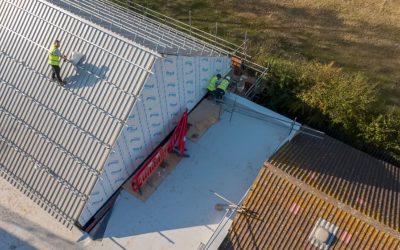Businesses have a wide range of internal needs based on industry, market niche and a number of other factors. In many cases, their external needs vary just as greatly. Those structures housing the nation’s businesses offer protection against the elements, and their roofs are vital components in this task. Several different types of materials are available for industrial roof installation in Oahu, each with its own distinct set of benefits.
Metal
Tin; aluminum; copper and stainless, stone-coated and aggregate steel are among the popular types of metal used for commercial and industrial roofing. All offer considerable fire resistance, durability, aesthetic appeal and versatility among other advantages. They’re also often more affordable when compared to the alternatives. Though a number of business owners express concern over rust and corrosion, metals used for roofing are coated with protective layers to prevent such issues.
EPDM
Ethylene Propylene Diene Monomer, or EPDM, is a single-layer, rubber-like material. It’s highly resistant to ultraviolet rays, certain types of acid and cleaning agents as well as high winds and storms. This type of material also reflects heat, so it goes a long way toward boosting energy efficiency and lowering cooling costs. While the material itself may be more expensive than some other options, ease of installation and low maintenance requirements help reduce long-term costs.
Built-Up Roofing
This type of industrial roof installation in Oahu entails the tar-and-gravel variety roofing often seen on schools, large-scale factories and other buildings across the country. It’s highly durable and among the least expensive options on the market. Built-up roofs are also extremely flexible because they can easily be modified to meet the durability and insulative requirements of virtually any business.
Thermoplastic
When it comes to withstanding storms, flying debris and high temperatures, thermoplastic roofing systems are among the hardiest alternatives. Roofs made from these materials are also able to withstand various types of acids, oils and fats. Thermoplastics work well for new builds as well as re-roofs.
These are only a few of the roofing options today’s businesses have at their disposal. Consider typical weather patterns, types of emissions and byproducts potentially generated by the company and budget along with other factors before deciding which one might best suit your needs. Contact us to learn more about the benefits and applications of the various roofing materials available.



